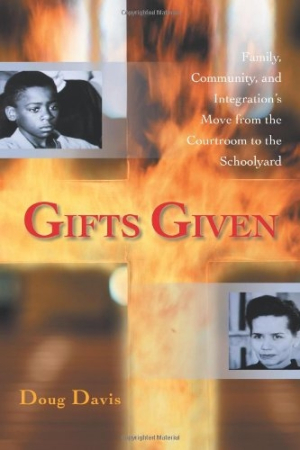Gifts Given
Family, Community, and Integration's Move from the Courtroom to the Schoolyard
Because he grew up in a significant place and time, Doug Davis’ childhood memoir has more traction than most. The author has written about those long-ago days as well as many other details of his family’s personal history. His parents were intimately involved in the nation-changing occurrences in Clinton. His mother was a teacher at the school, and his father was a lawyer caught up in the court case that led to the legal enforcement of the Civil Rights Act there. Davis’ father chose to be an escort for the students walking to school, and his mother broke up fights among the high-school students who were swept up in the racial tensions of the times. Now a music professor at California State University, Davis has clearly patterned himself after his parents, both of whom were musicians. He states that, “To nurture the development of students is the most rewarding challenge of my life. Helping students gain insight from their perceptions and confidence in their abilities, imagination, and creativity is the great pleasure of being a teacher.”
In Gifts Given, recounted in a gently humorous Southern style, he combines the stark events of 1956, when Clinton faced its “moment of decision,” as a local preacher put it, with softer and more diffuse memories of the Davis family.
The author has a PhD from Harvard, and his recollections do not disappoint from the standpoint of readability and literary reference. The crux of his book is the year when the author was eight, when his world, and the country, changed forever. The book restlessly returns to those events again and again, as the author revisits his past. During the autumn of 1956, shots were fired in Clinton, mob violence ruled for a time, the National Guard was called in, and white supremacist groups stirred up the populace, as the author notes, “spewing hate.”
Young African Americans who led the desegregation struggle were treated decently in classrooms, but they were mocked, tormented, and attacked in the halls of the school. The Davis family lived on the outskirts of town, but was targeted by racists. A cross was burned in their front yard. Davis recalls that he and his brothers were alone in the house that evening and instinctively knew that calling the fire department would be of no avail; neighbors did not offer assistance. Too young to understand the importance of these incidents at the time, Davis now believes that his parents, and others who believed in integration and saw it as the law of the land, were put under nearly intolerable pressure. Giving in to the forces of hatred, however, was not an option. His parents emerged as minor heroes, his father’s image forever enshrined in a photograph taken when he accompanied the twelve African Americans to school.
Doug Davis has written with passion and humor about his childhood. Though many details of Gifts Given will be of little interest to those outside of the Davis family and the immediate region, the central story of desegregation in a small American town is what will stand out for the general reader.
Reviewed by
Barbara Bamberger Scott
Disclosure: This article is not an endorsement, but a review. The publisher of this book provided free copies of the book and paid a small fee to have their book reviewed by a professional reviewer. Foreword Reviews and Clarion Reviews make no guarantee that the publisher will receive a positive review. Foreword Magazine, Inc. is disclosing this in accordance with the Federal Trade Commission’s 16 CFR, Part 255.

